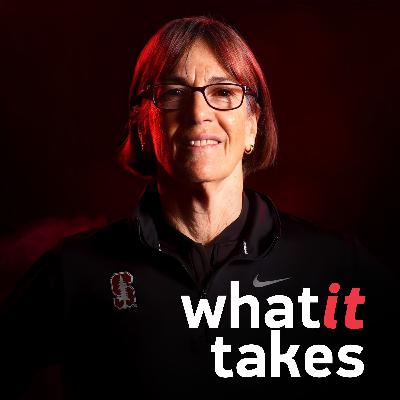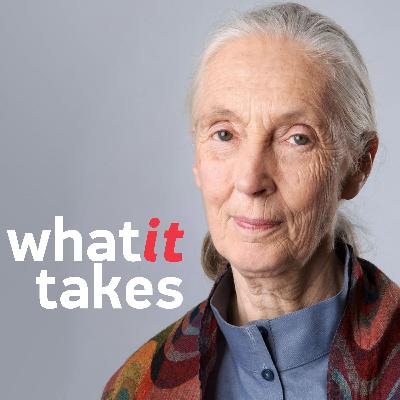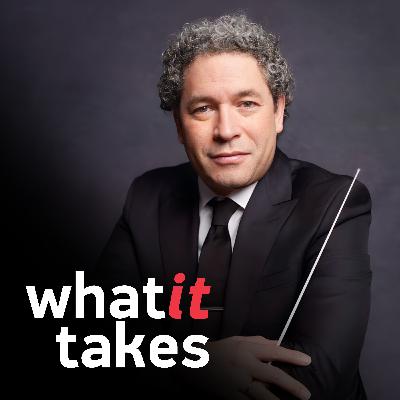Discover What It Takes®
What It Takes®

What It Takes®
Author: Academy of Achievement
Subscribed: 11,970Played: 61,885Subscribe
Share
© American Academy of Achievement 2015-2025
Description
Revealing, intimate conversations with visionaries and leaders in the arts, science, technology, public service, sports and business. These engaging personal stories are drawn from interviews with the American Academy of Achievement, and offer insights you’ll want to apply to your own life.
227 Episodes
Reverse
She is one of the greatest basketball coaches in history, and an inspiration to generations of young women. Tara VanDerveer was head coach of the Stanford Women's Basketball team for 38 seasons. She led her team to three NCAA Championships. She also led the national women's basketball team to a gold medal at the 1996 Olympics. Here she talks eloquently about her lifelong love for the game and about her frustrations early in life, before Title IX, when there were no women's teams available to her. She also talks in detail about her unique and winning approach to coaching, and describes the ways she finds basketball metaphors in everything she does!
She is a sports icon and a trailblazer for women. She won 39 Grand Slam tennis titles during her career, and she fought for equal pay and equal opportunity for women in the game. She founded the Women’s Tennis Association and was the first woman named Sportsperson of the Year by Sports Illustrated Magazine. She captivated the world when she won "The Battle of the Sexes".against Bobby Riggs. Now 81 years old, Billie Jean King has a lot of thoughts about her storied career, and many tales to tell!
As a girl in England, Jane Goodall dreamed of traveling to Africa to study animals in the wild. In 1960, that dream brought her to Tanzania, to observe the wild chimpanzees at Gombe Stream Park. As she describes in this episode, other scientists did not believe that a young woman could survive alone in the bush, but Jane Goodall did more than survive. Her work revolutionized the field of primatology. She was the first to document chimpanzees making and using tools, an activity that had been thought exclusively humans. Over the years she also witnessed cooperative hunting and altruism, but also brutality and even warfare among chimps. Her work, the longest continuous field study of any living creature, has given us deep insights into the evolution of our own species. Since the 1980's, she has devoted herself single-mindedly to educating the public worldwide about the connections between animal welfare, the environment, and human progress. (c ) American Academy of Achievement 2017
Ozempic is one of the most important new medications in a generation. The driving force behind it is the Danish pharmaceutical company Novo Nordisk, which has been invested in GLP-1 research since the early 1990s. The leading scientist in this domain, a self-described "nerd," who grew up on a farm in Denmark and has no interest in the limelight. Lotte Knudsen started her career working on laundry detergent enzymes, but eventually joined a team at the Danish pharmaceutical company Novo Nordisk that was tasked with looking for new treatments for diabetes. She was convinced that a recently discovered human hormone called GLP-1 could be made into a powerful medication, not only for Type 2 diabetes, but also for weight loss. It took 20 years of hard work and persistence for her and her team to figure it out, but their creation now shows promise as a worthy foe of heart disease, kidney disease, Parkinson's, alcoholism & Alzheimer's as well. In this episode Lotte Knudsen tells her story, and we hear from two of the other scientists who made critical contributions to this revolution in medicine: Mads Thomsen and Daniel Drucker.
When he was just 26 years old, Gustavo Dudamel arrived from Venezuela to become conductor and music director of the Los Angeles Philharmonic. He immediately became one of the world's most beloved figures in classical music. He's collaborated with pop stars (including Billie Eilish, Nas and Christina Aguilera). He's played the Super Bowl half-time show. He even the model for the main character in the hit tv series "Mozart in the Jungle". Sixteen years later, after making an enormous mark on the LA Phil and the city of LA, Gustavo Dudamel is preparing to move east, as music director and artistic director of the New York Philharmonic. He talks here about coming up as a musician and a budding conductor in "El Sistema", Venezuela's classical music training ground for children of all backgrounds. He describes conducting his toy figurines while listening to the world's greatest orchestras, before he even understood what conductors actually do. And he shares his love of music - all music - and his work to erase boundaries between audiences.
Johnny Cash had a voice that could make a mountain quake. And his impact on the world of music is so legendary that this week a new 11 feet tall bronze statue of the singer, guitarist and humanitarian was unveiled at the United States Capitol Visitor's Center. It was donated by the state of Arkansas and it is the first-ever statue of a musician in the collection. To celebrate, we invite you to take a new listen to the very first episode of What It Takes. You'll hear the deeply introspective Cash near the end of his career (1993). He reflects on how he overcame considerable personal obstacles and turned his failures into the stepping stones to success. He also talks about the first music he remembers, the voice teacher who advised him to stop taking lessons, and the source of his creativity.
In honor of James Earl Jones, who has died at the age of 93, we bring you this encore episode. James Earl Jones had a voice like no other. It reverberated so deeply that you could feel it in your chest. No one was better suited to give voice to Darth Vader. For 60 years, Jones captivated audiences with that voice and with his commanding presence -- on stage and on screen. In this episode, which originally posted in 2017, he talked about how he overcame a stutter that silenced him for years. He explained how the radicalism of the 1960's changed the world of acting, and opened the door to his success. And he described how growing up on a humble farm taught him to treasure contentment over happiness. The theme music for What It Takes is written and performed by KaraSquare.com. (c ) American Academy of Achievement 2017
In honor of Edna O'Brien, who died this week at 93, we invite you to listen to this re-broadcast of our episode. Edna O'Brien's first novel, "The Country Girls," was banned in Ireland, and burned in her own home parish. The year was 1960, and young Irish women of that era were NOT supposed to reflect on their lot in life, or harbor sexual desires. But Edna O'Brien had one goal as a young writer - to tell the truth. Decades later, her compatriots finally came to view her the way the rest of the world did: as a trailblazer, and as one of Ireland's greatest writers. Forty plus books and plays later, truth-telling was still Edna O'Brien's goal when we talked to her, at the age of 91, about her life and her love of words.(c ) American Academy of Achievement 2024
One of the greatest and most admired rock n’ rollers of all time talks about his long and fascinating life in music. Pete Townshend, guitarist and songwriter for The Who, now 79 years old, describes the band’s formation in high school and the tension in his relationship with frontman Roger Daltrey. He recounts how he became the original smasher of guitars. He openly discusses the emotional and sexual abuse he suffered as a child, and considers how it affected his life as an artist. And he speculates on why his rock opera “Tommy” connects today with audiences, 50 years on (it has to do with COVID). Oh, and he drops plenty of f-bombs! Hey, it’s rock n’ roll.
We invite you to honor and celebrate the great Willie Mays, who died this week at the age of 93, by taking a listen to the stories he told about his life on this episode. It was one of the first episodes of "What It Takes," and it remains one of our all-time favorites:Baseball fans may argue to this day about which was the best of Willie Mays’ many spectacular catches, but nearly all agree — he was one of the most versatile, virtuosic players of all time. In this episode, featuring an intimate interview with Mays recorded in 1996, the Hall-of-Famer talks about growing up in segregated Alabama, and winning over racist baseball fans soon after he became the first African-American player on his team. He recalls the day he got the call to move up to the majors, and describes in delightful terms how he never had to actually work at being a great athlete. He also talks about the catch he swears was better than “The Catch.” Hearing his voice, you’re reminded why Willie Mays was one of America’s most beloved baseball players, as well as one of its greatest. (c ) American Academy of Achievement 2015-2024
Jeff Koons is one of the most successful artists of our time. For 40+ years, his iconic works have brought a sense of playfulness to museums worldwide, and sometimes a bit of controversy as well. His iconic pop art sculptures include a giant pink rabbit that looks so remarkably like a shiny mylar inflatable, it's hard to believe it is made of metal. His balloon dog, the type you'd see at a child's birthday party, likewise demands a second look. In this recent interview, Koons describes his lifelong love of gazing balls, like the ones he saw growing up in York, Pennsylvania, and how he came to incorporate them (and other reflective surfaces) into his art. He talks about his days as a young, aspiring artist, and his unlikely meeting with Salvador Dalí. And he talks about what's next, as he prepares to launch his latest pieces into space.
The COVID-19 vaccine came out at warp speed because of the work of these two scientists. This week, they were awarded the Nobel Prize in Physiology or Medicine. In celebration, we are re-posting our episode about Katalin Karikó and Drew Weissman. For many, many years they investigated the secrets of messenger RNA (mRNA). And when the pandemic began, their research was ready and waiting. On this episode you’ll hear Katalin Karikó talk about her humble beginnings in Hungary, and the forces that enabled her to persevere, even though for decades people thought her ideas about mRNA were laughable. She was denied grants, lost jobs and wasn’t taken seriously, but she never wavered. Fortunately, she met Drew Weissman one day at a copy machine, where they both worked at the University of Pennsylvania. Dr. Weissman was an immunologist, working on a vaccine for HIV. He was interested in Karikó’s work and they began to collaborate. Even when they made major discoveries, they could not get support for their work… until the Corona Virus appeared. Now the scientific world sees the potential that Karikó and Weissman saw all along: that mRNA may open the door to many other vaccines and to therapeutic treatment for a host of illnesses, from Cancer to Sickle Cell Anemia to Heart Disease. (c ) American Academy of Achievement 2023
Gordon Lightfoot has died, at the age of 84. He spoke with the Academy of Achievement last year, and we featured that interview in an episode. To honor the legendary singer and songwriter, we are re-posting the episode today. Gordon Lightfoot had a slew of international hits in the 1960's and 70's, including "If You Could Read My Mind," "Sundown" and The Wreck of the Edmund Fitzgerald." His songs were also performed by some of the biggest stars of that time, including Jerry Lee Lewis, The Grateful Dead, Elvis Presley, Bob Dylan, and Barbra Streisand. Lightfoot was still writing and performing into his 80's. In this interview you will find him as charming a raconteur as you might expect, given the nature of the songs he writes. He talks about his childhood in a small town in Ontario, and about his path to the top of the music industry. He describes the quirks of his songwriting process, and explains why he changed the words of "Edmund Fitzgerald" after he recorded it. (c ) American Academy of Achievement 2022-2023
These two Pulitzer Prize-winning biographers have spent their careers delving into the lives of Americans who changed the course of U.S. history. T.J. Stiles and David Blight talk here about how historical biography can bring us closer to an understanding of the times we live in. They discuss why Jesse James, General George Custer, Cornelius Vanderbilt and Frederick Douglass are relevant still. And they let us in on some surprising aspects of their own lives!© American Academy of Achievement 2023
Wayne Shorter was a legendary saxophonist and composer whose career began in the 1950's and spanned the development of modern jazz. Mr. Shorter died this week, at the age of 89. To honor his life and music, we are bringing back this episode, which originally aired in 2017. It features Wayne Shorter and a jazz artist 50 years his junior: Esperanza Spalding. Ms. Spalding is a bass player, composer, lyricist and singer - and one of the most exciting artists in contemporary jazz. Wayne Shorter and Esperanza Spalding may have come of age during different jazz eras and in different parts of the country, but they became friends and artistic soulmates, who shared many of the same views about making music and the creative process.(c ) American Academy of Achievement 2017-2023
Fifty years ago today (January 27, 1973), the United States' military involvement in the Vietnam War came to an end, with the signing of the Paris Peace Accords. We mark that occasion by bringing back our episode on two brave reporters, who risked their lives and their reputations during the war in Vietnam, to reveal the truth to the American people about what was happening there. Both describe here - how and when they realized the United States government was lying about the causes and the scope of the war. And both eloquently explain their views on the role of the journalist as a witness and an adversary of government. Neil Sheehan, who died earlier this month, also talks about his role in exposing the Pentagon Papers in the pages of the New York Times. And he details why he was driven to spend over 13 years writing a definitive history of the war, called "A Bright Shining Lie," which won the Pulitzer Prize. Mr. Halberstam, who won the Pulitzer during the war, went on to write one of the other most important accounts of U.S. involvement in Vietnam: "The Best and the Brightest."(c ) American Academy of Achievement 2021-2023
In honor of Martin Luther King Jr. Day, we treat you to a re-broadcast of this episode from 2017. Maya Angelou and Martin Luther King Jr. were close friends, years before Angelou became known throughout the world for her memoir “I Know Why the Caged Bird Sings." In this, the second our two Maya Angelou podcasts, she offers her personal reflections of Dr. King as a poet and a man with great humility and a sense of humor. She talks about the state of the African-American community decades later, and the importance of using language to uplift (describing an encounter she had with Tupac Shakur to make her point). And in her powerful, unique voice, she reminds us of the eternal relevance of Dr. King's wisdom.(c ) American Academy of Achievement 2017-2023
Contemplating what movie to watch this holiday week? You can't go wrong with "When Harry Met Sally," perhaps the greatest rom-com of all time. Nora Ephron, who wrote the screenplay, as well as other great movies and books, knew just how to make people laugh and cry and kvell. But mostly laugh. She was a successful director and producer too, in an industry not very hospitable to women. In this episode, Ephron shares the most important lesson she learned from her mother: that all pain is fodder for a good story. She explains why becoming a journalist was the best thing she ever did. And she tells stories from her later career in Hollywood, including the one about how the famous faked-orgasm scene in "When Harry Met Sally" came about.(c ) American Academy of Achievement 2017-2022
2022 was a big year for John Irving, the author of "The World According to Garp," "A Prayer for Owen Meany," and "The Cider House Rules." He turned 80, and just recently published The Last Chairlift, his first novel in seven years. It is 913 pages long and is, he says, the last long book he will ever write. Seemed like a great time to bring back our 2016 episode on John Irving. In it, he talks about why he approaches every book by writing the last sentence first. And he might just convince you that his uncommon approach is the only one that makes any sense. In this episode, he also opens up about his early life, and reveals how his mysteriously absent father, his learning disability, and his passion for wrestling, all contributed to his success as a writer. Whether you've read every John Irving novel or none, this is a fascinating story about the writing process, and about an author some critics have called the Charles Dickens of our time.(c ) American Academy of Achievement 2016-2022
He had a slew of international hits in the 1960's and 70's, including "If You Could Read My Mind," "Sundown" and The Wreck of the Edmund Fitzgerald." His songs were also performed by some of the biggest stars of that time, including Jerry Lee Lewis, The Grateful Dead, Elvis Presley, Bob Dylan, and Barbra Streisand. Today, at 84 years old, Gordon Lightfoot is still writing and performing. He is as charming a raconteur as you might expect, given the nature of the songs he writes, and talks here about his childhood in a small town in Ontario, and about his path to the top of the music industry. He describes the quirks of his songwriting process, and explains why he changed the words of "Edmund Fitzgerald" after he recorded it. (c ) American Academy of Achievement 2022


























very inspiring
👏👏
26:45 SAMPLE THIS
Awsome. I LIKE her so much and am proud of her as a woman ...world's citizen
08:30
08:30
51:10
Nice
who is that person that wrote the first architecture?
One of the best Dalio podcast.